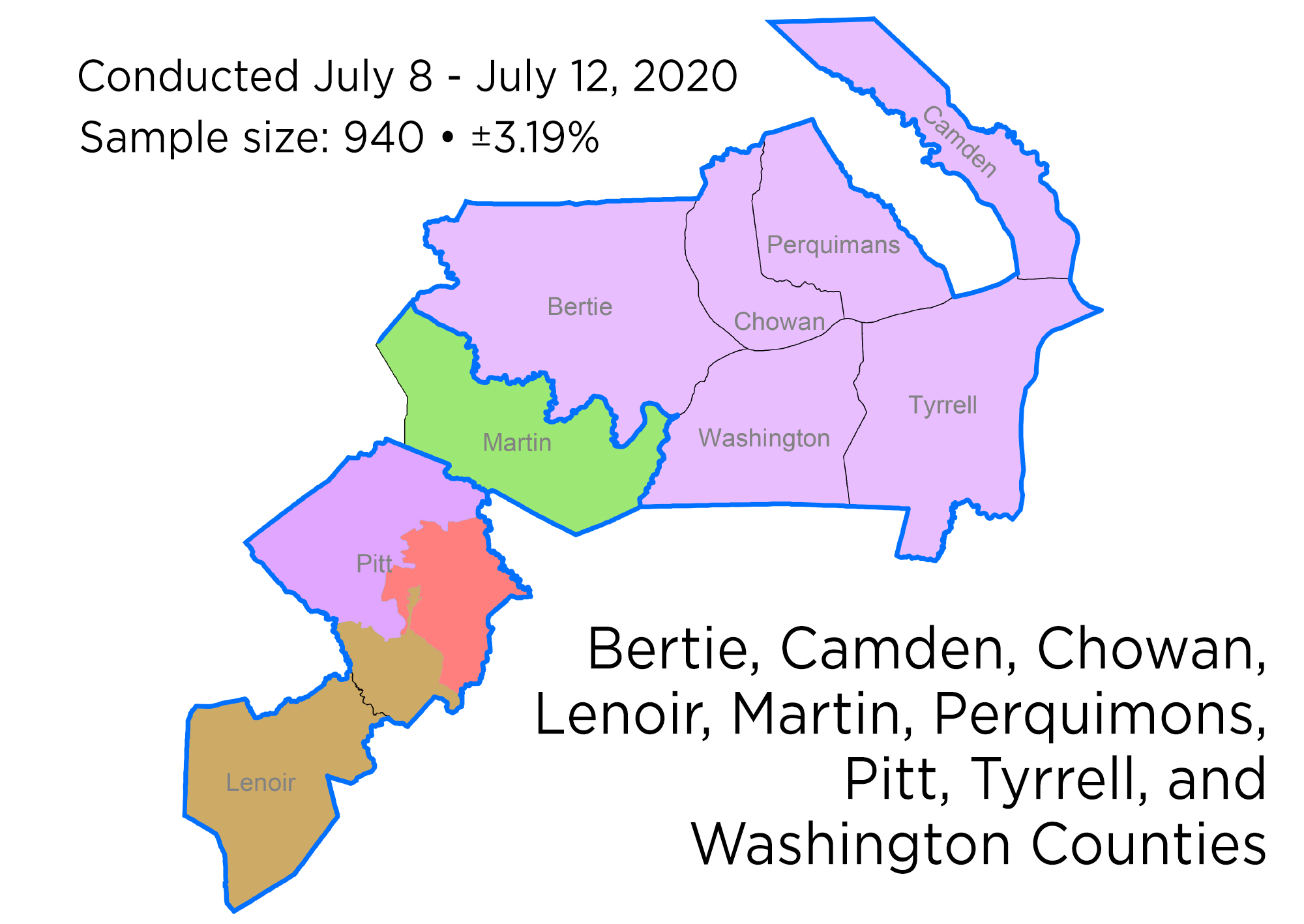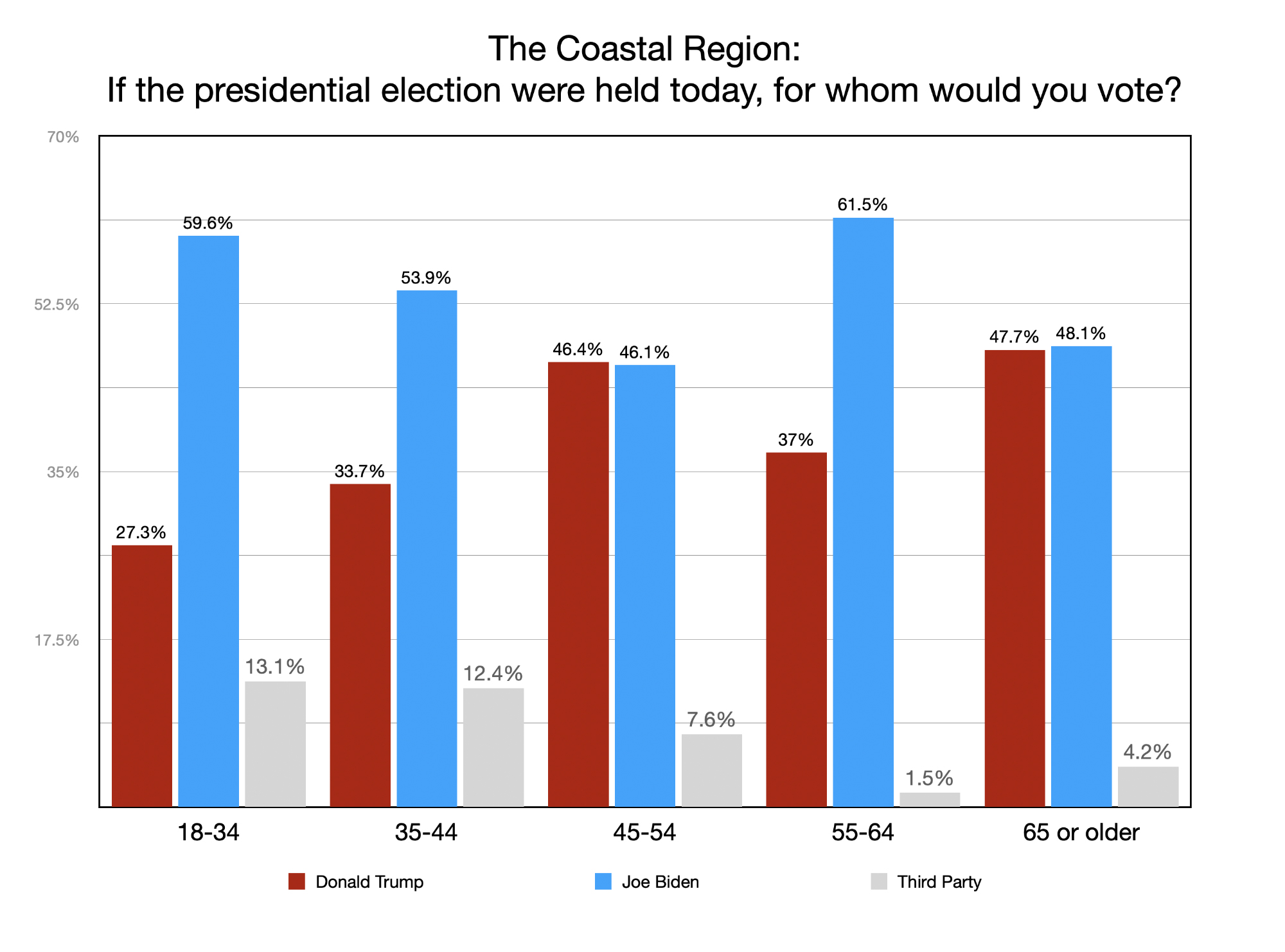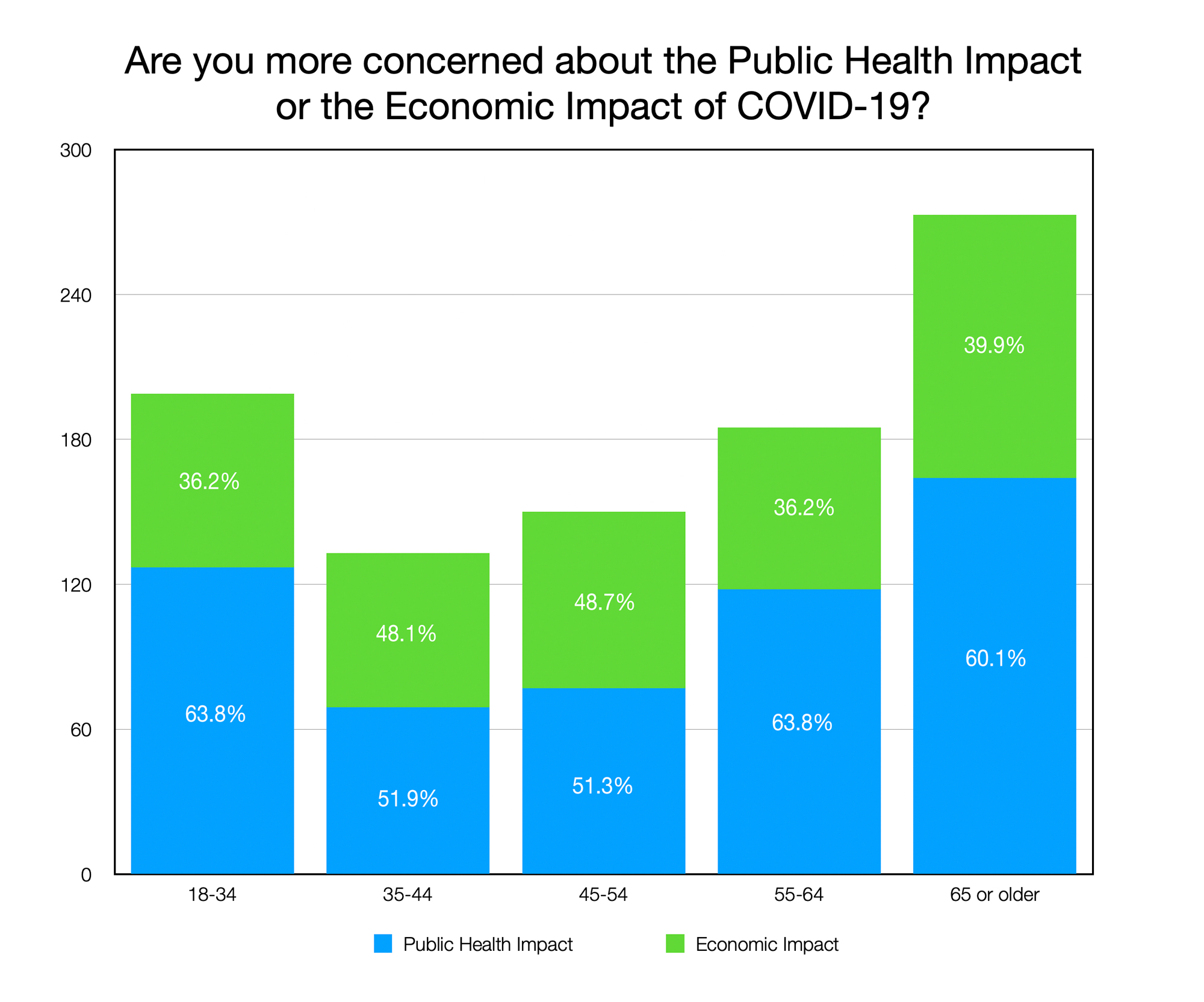
Demographics and Voting Behaviors
940 likely voters (57.2% of whom were female) from nine eastern counties in the Coastal Region of North Carolina (Bertie, Camden, Chowan, Lenoir, Martin, Perquimons, Pitt, Tyrrell, and Washington Counties) were surveyed from July 8 to July 12, 2020. 56.1% were white, 37.9% were black, and 1.8% were Hispanic or Latino.
The age ranges in this group skewed disproportionately towards those 65 years or older at 29%, while those 18 to 34 years old came in second at 21.2%. 14.2% were 35 to 44 years old, 15.9% were 45 to 54 years old, and 19.7% were 55 to 64 years old.
A majority of respondents in the Coastal Region live in rural areas, at 52.7%. 35.9% were suburban voters, and 11.4% lived in an urban environment. Just 20.2% identified as “suburban women,” a key demographic in the upcoming presidential election.
80% of those surveyed in the Coastal Region reported an annual income of $100,000 or less. Educational levels were more evenly distributed in this group, with 25.1% reporting having a college degree, 16.7% with some college experience, and 20.6% having a high school degree or less.
Nearly half (49.5%) of these voters are registered Democrats, 27.9% are registered Republicans, 20.9% are Unaffiliated, and just 1.7% are registered with a third party.
40.6% of these voters identified as conservatives, 30.1% identify as moderates, and almost a quarter (22.8%) of the total identified as being liberal in their political beliefs. Just 8.8% of voters on the coast identified as being “very liberal.”
The Coastal Region also has the highest number of those identifying as moderates, distributed fairly evenly across all age groups. For those aged 18-34 years of ages, 34.3% claimed to be moderate in their political beliefs; for those 35 to 44 years of age, 39.6%; for those 45 to 54 years of age, 30.2%; for those 55 to 64 years of age, 32.3%. A majority of respondents (52.6%) in this region who were 65 years and older identified as being conservatives, 21% considered themselves moderates, and a near equal amount (21.3%) considered themselves liberal in their political beliefs.
When asked “If the general election for President were held today, would you vote for Donald Trump, the Republican; Joe Biden, the Democrat; or a third-party candidate,” a majority (53.7%) chose Democrat Joe Biden, 39.1% chose Republican Donald Trump, and 7.2% chose an unnamed, third-party candidate. These results mirror those of the Triad Region, where 52.9% chose Mr. Biden, 40.4% chose Mr. Trump, and 6.7% chose an unnamed, third-party candidate.
- Men in the Coastal Region are evenly split in their choice for president, with 45.7% of men saying they support Mr. Trump and 46,2% indicating they will vote for Mr. Biden.
- A significant majority of women (59.3%) in the Coastal region intend to cast their vote for Mr. Biden.
- Self-identified moderates in the Coastal Region overwhelmingly intend to vote for Mr. Biden, at 71.2%.
- A whopping 88% of black voters in the coastal region say they will vote for Mr. Biden, while 61% of white voters support Mr. Trump.
- Majorities in every income range in the Coastal Region say that they will vote for Mr. Biden, with the strongest support coming from those earning less than $50,000 per year at 56%.

When analyzed by age range, Mr. Biden led Mr. Trump with sizable majorities in every age grouping except those voters 45 to 54 years old and those voters 65 years or older, where they were essentially tied in both cases.
The Coronavirus Pandemic
A majority (59.1%) of survey respondents in the Coastal Region felt that the public health impact of the COVID-19 pandemic was of greater concern than was its economic impact.

When broken down by age, significant majorities existed in almost all ranges who felt that the public health impact was of greater concern, with the exception of those between 35 and 44 years of age and those between 45 and 54 years of age, whose majorities were much narrower, at 52% and 51.3%, respectively.
As with other regions in the state, Republicans and Democrats are sharply divided over the question. While 80.9% of Democrats felt that the impact on public health was of greater concern than was the impact on the economy, 77.9% of Republicans felt that the impact on the economy was greater. These numbers essentially mirror the numbers from every other region in the state.
When the following question was asked:
In response to the coronavirus outbreak, Governor Roy Cooper mandated a statewide shutdown. This has caused significant economic loss as travel and tourism has drastically decreased. Which position best represents your view about the shutdown?
- I support shutting down the state because public health is more important, or
- I oppose shutting down the state because it will have a negative economic impact.
63.4% of total respondents said they supported the shutdown. Women supported the shutdown more widely than men at 69.2%, while men as a group opposed the shutdown of the state by a majority of 55.8%.
Protests
When the following question was asked:
Thinking about the recent killing of George Floyd by a white police officer, do you support or oppose the protests that have happened across the country as a result?
69.7% of the women surveyed in the Coastal Region supported the protests, while 61.5% of men supported the protests. Those under the age of 55 overwhelmingly supported the protests (at a 72.8% mean rate), while a smaller majority of those 55 years and older supported them, at 59.3%.
95.2% of Black voters in the Coastal Region support the protests and a slight majority (52%) of white voters oppose them.
A 67.2% majority of those making an annual income of less than $50,000 support the protests. 65.6% of those making an annual income over $50,000 but less than $100,000 support the protests, and those reporting an annual income of $100,000 or more support the protests by 65.9%.
Similarly, varying but significant majorities support the protests across all educational levels.
As is the case in other regions across the state, a significant majority (in this case 75.9%) of Republicans opposed the protests, while 91% of Democrats and 63.4% of Unaffiliated voters supported them. A majority (58.9%) of rural voters supported the protests, while urban and suburban voters showed even stronger support, at 79% and 72.8%, respectively.
Overall, voters in the Coastal region have the highest degree of support for the protests.
Looting
Respondents were asked the question “Do you agree or disagree that the rioting and looting that has occurred during the protests is justified to bring about necessary changes?” 77% of those surveyed disagreed that riots and looting are justified.
Voters of all age groups in the Coastal Region disagree that rioting and looting are justified, as do men (81.2%) and women (73.9%)
Republicans are near unanimous in their disagreement that the riots and looting are justified, with 98.4% indicating so. Over a third of Democrats surveyed (35%) say they agree that the riots and looting are justified, while unaffiliated and third party voters disagree that the riots and looting are justified at 77.5% and 68.4%, respectively.
The only demographic group in the Coastal Region who believe that the riots and looting are justified are those identifying as “very liberal,” at 64%.
This is the fourth and final article in a series of four that will summarize the findings of polls commissioned by the Carolina Leadership Coalition over the summer. These polls were conducted by an award-winning national public opinion and predictive analytics firm which surveyed likely general election voters in four discrete geographic regions of North Carolina. You can download the full model results for the Coastal region here.



